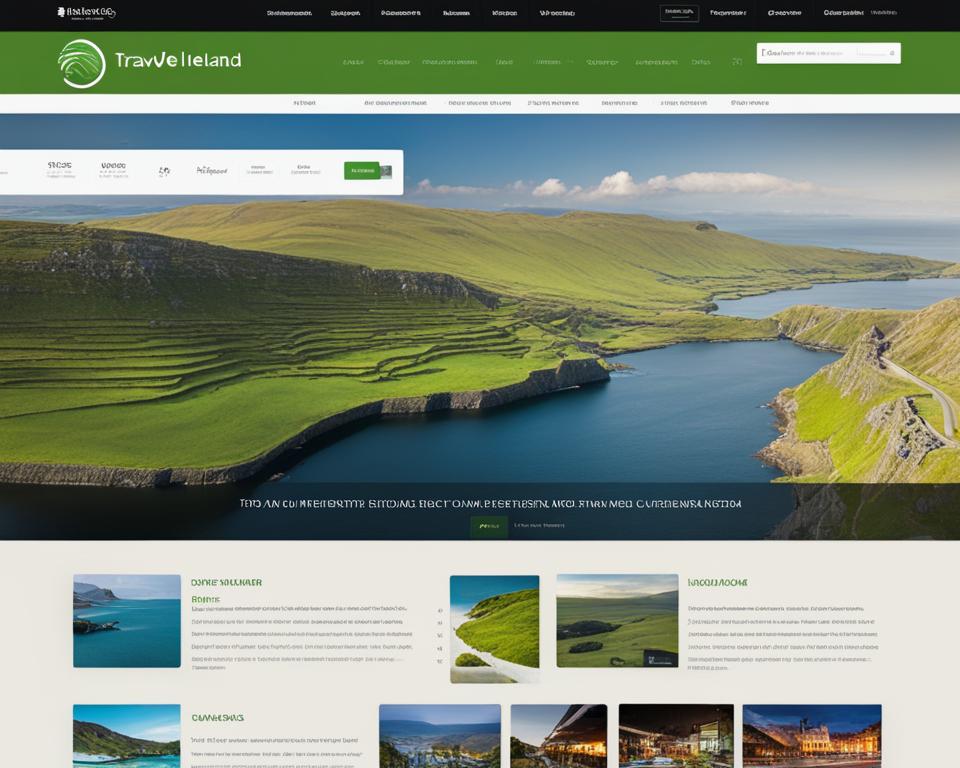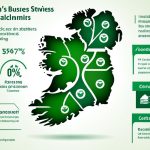Have you ever dreamed of starting your own travel business? If so, Ireland’s booming tourism sector offers an exciting opportunity to turn that dream into a reality. With a growing number of tourists flocking to the Emerald Isle each year, starting a travel business in Ireland could be your ticket to success.
In this comprehensive guide, we will walk you through the steps involved in starting a successful travel business in Ireland, from understanding the tourism sector to building your business infrastructure and marketing your services. Whether you’re a seasoned entrepreneur or a first-time business owner, our guide will provide you with all the information you need to get started.
Key Takeaways:
- Starting a travel business in Ireland can be a lucrative venture in a thriving tourism sector.
- Understanding the tourism market in Ireland and conducting thorough market research are essential first steps.
- Legal and financial considerations should be carefully addressed, including business registration, licenses and permits, and financial planning.
- Building a strong infrastructure, including a professional website and booking system, is crucial for success.
- Effective marketing strategies, both online and offline, are necessary for attracting customers and standing out from the competition.
Understanding the Tourism Sector in Ireland
If you’re considering starting a travel business in Ireland, it’s important to have a good understanding of the Irish tourism industry. Ireland is known for its stunning landscapes, rich history, and vibrant cities, making it a popular destination for travellers from all over the world. In recent years, the travel market in Ireland has experienced steady growth, with a record-breaking 11.2 million overseas visitors in 2019.
According to tourism statistics, the top five countries of origin for visitors to Ireland in 2019 were:
| Country | Number of Visitors |
|---|---|
| United Kingdom | 4.5 million |
| United States | 2.1 million |
| Germany | 841,000 |
| France | 540,000 |
| Spain | 443,000 |
These statistics provide valuable insights into the travel market in Ireland, helping you identify potential target audiences for your travel business. However, it’s important to note that the impact of COVID-19 has had a significant effect on the tourism sector in Ireland, with a 76% decrease in overseas visitor numbers in 2020.
Despite the challenges posed by the pandemic, the Irish tourism industry has shown resilience and determination to recover. By keeping up to date with the latest tourism statistics and market trends, you can stay ahead of the curve in starting your own successful travel business in Ireland.
Market Research and Analysis
Before embarking on your travel business journey in Ireland, it is essential to conduct thorough market research and analysis to ensure you understand the market and can identify potential opportunities.
The first step in market research for a travel business is identifying your target audience. Determine the type of travellers that would be interested in your services, whether it be budget travellers or luxury travellers. Once you have identified your target audience, you can tailor your services to meet their needs and preferences.
Conducting competitor analysis is another crucial step in market research for a travel business. Research your competitors’ services, prices, and target audience to identify gaps in the market that you can fill. Additionally, analyzing your competitors’ strengths and weaknesses can help you develop strategies to differentiate your services and stand out in the market.
A helpful tool in market research for a travel business is conducting surveys and gathering feedback from potential customers. This can provide valuable insights into what potential customers are looking for in a travel business and help you improve your services accordingly.
Identifying Opportunities in the Market
Based on your market research, you may identify potential opportunities for your travel business in Ireland. For example, you may notice a gap in the market for sustainable and eco-friendly travel options. By catering to this niche, you can differentiate your services and attract a specific target audience.
Another potential opportunity could be targeting a specific geographical location or type of travel experience. For example, you may focus on providing experiences in lesser-known destinations or specialize in adventure travel.
Presenting Your Findings
After completing your market research and analysis, it’s time to present your findings in a clear and concise manner. Consider creating a table to showcase your competitors’ strengths and weaknesses or using a graphic to display market trends and statistics. This will help you and your team visualize the data and identify key insights.
In conclusion, conducting in-depth market research and analysis is crucial in starting a successful travel business in Ireland. By identifying your target audience, analyzing your competitors, and identifying potential opportunities, you can create a strong foundation for your travel business.
Legal and Financial Considerations
Starting a travel business in Ireland requires careful attention to legal and financial considerations. It is important to research and comply with all necessary regulations to ensure that your business is operating legally in the country.
Business Registration in Ireland
The first step is to register your business with the Companies Registration Office (CRO) in Ireland. This process involves choosing a name for your business, deciding on a legal structure (such as a sole trader or a limited company), and submitting the necessary registration forms and fees. You can find more information on the CRO website.
Travel businesses in Ireland are required to obtain certain licenses and permits depending on the type of services they offer. For example, if you plan to offer tours or transportation services, you must obtain a Public Service Vehicle (PSV) license. If you plan to sell travel packages, you need to be licensed by the Commission for Aviation Regulation (CAR) and bonded by the Irish Travel Agents Association (ITAA). You can find more information on the CAR and ITAA websites.
Financial Planning
Starting a travel business requires careful financial planning to ensure that the venture is sustainable and profitable. You will need to create a business plan that includes projected income and expenses, as well as a marketing plan that outlines how you plan to attract customers and generate revenue. You may also need to secure financing to cover startup costs, such as website development, equipment purchases, and marketing expenses.
Note: It is recommended to consult with a financial advisor or accountant to ensure that your financial plan is feasible and compliant with Irish regulations.
Building Your Travel Business Infrastructure
As a travel business owner, you need to establish a strong infrastructure to provide your customers with the best possible experience. Here are some essential components you need to consider:
Travel Business Website
Your website is the face of your business, and it needs to be professional, user-friendly, and visually appealing. Consider hiring a web designer to create a website that showcases your services in the best possible light. Your website should have a clear and concise description of your travel packages, pricing, booking process, and contact information.
Booking System
A reliable booking system is crucial for any travel business. Your customers need to be able to book their travel arrangements quickly and easily, so consider investing in a user-friendly booking system that offers real-time availability and pricing information. This will not only make booking easier for your customers, but it will also help you manage your operations more efficiently.
Partnerships and Collaborations
Collaborating with other businesses in the tourism industry can help you expand your offerings and reach new markets. Consider partnering with airlines, hotels, tour operators, and travel bloggers to create unique travel packages that offer added value to your customers. Building strong partnerships can also help you access exclusive deals and discounts that you can pass on to your customers.
In Conclusion
Building a strong infrastructure is crucial for any travel business in Ireland. By investing in a professional website, a reliable booking system, and strategic partnerships and collaborations, you can establish a solid foundation for your business that will attract and retain customers.
Marketing and Promoting Your Travel Business
In today’s competitive market, effective marketing and promotion are critical for the success of your travel business. By implementing the right marketing strategies, both online and offline, you can attract potential customers and stand out from the competition. Here are some travel business marketing strategies for you:
Online Promotion
With more and more customers turning to the internet for their travel needs, having a strong online presence is vital. Here are some tips to help you promote your travel business online:
- Create a professional website that is user-friendly and visually engaging. Include all relevant information about your services, pricing, and contact details. Don’t forget to optimize your website for search engines (SEO) so that potential customers can easily find you.
- Invest in online advertising, such as Google Ads or Facebook Ads, to increase your visibility and attract more clients.
- Utilize social media platforms, such as Facebook, Instagram, and Twitter, to engage with potential customers, showcase your services, and build a loyal following. Make sure to regularly post high-quality content and respond to customer inquiries and feedback in a timely manner.
- Create a blog or vlog to share travel tips, destination guides, and other useful information. This can help establish your authority in the travel industry and attract more traffic to your website.
Remember, your online presence is often the first impression that potential customers will have of your travel business, so make sure it’s a good one!
Offline Promotion
While the internet is a powerful tool, it’s important not to neglect traditional offline methods of promotion. Here are some offline promotion strategies to consider:
- Distribute high-quality print materials, such as brochures, flyers, and business cards, to local businesses, tourist information centers, and other relevant locations.
- Attend travel and tourism events, such as trade shows and conferences, to network with potential partners and clients.
- Sponsor local events or sports teams to increase your visibility in the community.
- Offer referral discounts or other incentives to encourage satisfied customers to spread the word about your travel business.
Social Media Marketing
Social media can be a powerful tool for promoting your travel business and engaging with potential customers. Here are some tips to maximize your social media marketing efforts:
- Choose the right social media platforms for your business and target audience. For example, Instagram is great for showcasing stunning travel photos, while LinkedIn is more suited for B2B networking.
- Create a social media content calendar to ensure you’re regularly posting high-quality content that aligns with your business goals and target audience.
- Engage with your followers by responding to comments, messages, and other forms of feedback. This shows that you value their input and are committed to providing excellent customer service.
- Use hashtags to increase the visibility of your posts and attract new followers. Make sure to research relevant and popular hashtags for your industry.
Providing Exceptional Customer Experiences
At the heart of any successful travel business is prioritizing customer service. The satisfaction of your customers can make or break your business, so it’s important to go the extra mile in ensuring their needs are met and expectations exceeded. Below are some tips on how to provide exceptional customer experiences in your travel business:
1. Personalized Travel Experiences
One way to stand out from the competition is to offer personalized travel experiences to your customers. This could include customized itineraries, unique excursions, or special touches to make their trip unforgettable. Ask your customers about their interests and preferences, and tailor their travel experience accordingly.
2. Prompt and Courteous Customer Service
Be sure to respond to customer inquiries and concerns promptly and courteously, whether it’s through email, phone, or social media. Train your staff to handle customer interactions with professionalism, empathy, and a can-do attitude. Consider implementing a customer service policy that outlines your procedures for resolving issues and addressing complaints.
3. Active Listening and Feedback
Listen to your customers and actively seek feedback on their experiences with your travel business. Encourage them to share their thoughts and opinions, and use this feedback to improve your services and offerings. Consider implementing a customer feedback form or survey, and use the insights gained to continuously evolve and adapt your business to meet customer needs.
4. Going the Extra Mile
Provide extra touches to make your customers’ travel experiences truly exceptional. This could include welcome packages upon arrival, surprise upgrades, or thoughtful gestures to celebrate special occasions. By going the extra mile, you show your customers that you value their business and are committed to providing the best possible travel experiences.
By prioritizing exceptional customer experiences in your travel business, you can build a loyal customer base that will recommend your services to others and drive repeat business. Remember, happy customers are the key to success.
Conclusion
Starting a travel business in Ireland can bring a lot of opportunities for growth and success in the tourism sector. By following the comprehensive guide we have provided, you will have a solid foundation to begin your journey. Remember to stay up-to-date with the latest market trends, continuously adapt your services to meet customer demands, and prioritize exceptional customer experiences.
Good Luck!
We hope this guide has been helpful in your pursuit of starting a travel business in Ireland. Remember that building a successful business takes time, effort, and dedication. Keep in mind that challenges may arise, but with the right mindset and approach, you can overcome them and achieve your goals.
Thank you for reading, and we wish you the best of luck!
FAQ
How do I start a travel business in Ireland?
To start a travel business in Ireland, you need to first understand the tourism sector in the country. Conduct market research, analyze your competitors, and identify your target audience. Once you have a solid understanding of the market, register your business, obtain necessary licenses and permits, and create a financial plan. Build a strong infrastructure with a professional website, efficient booking system, and partnerships. Implement effective marketing strategies and prioritize exceptional customer experiences.
What should I consider when starting a travel business?
When starting a travel business, it’s important to consider legal and financial aspects. Register your business in Ireland, obtain the necessary licenses and permits for the travel industry, and create a financial plan. Build a strong infrastructure with a user-friendly website, efficient booking system, and strategic partnerships. Implement effective marketing strategies both online and offline, and prioritize exceptional customer experiences.
How can market research help my travel business?
Market research is crucial for your travel business as it helps you understand your target audience, analyze your competitors, identify potential opportunities, and find your unique selling points. By conducting thorough market research, you can make informed decisions and develop strategies that will set your business apart in the travel market.
What marketing strategies can I use for my travel business?
There are various marketing strategies you can use for your travel business. Consider online platforms such as social media and email marketing, as well as offline promotion through brochures and collaborations with local businesses. Utilize the power of social media marketing to engage with potential customers and showcase your services. Implement personalized marketing approaches that tailor experiences to individual customer preferences.
How important is customer service in the travel industry?
Exceptional customer service is vital in the travel industry. Providing outstanding experiences and personalized services will not only attract customers but also generate positive word-of-mouth and repeat business. Actively seek customer feedback and utilize it to continuously improve your services, ensuring customer satisfaction and loyalty.
How can I differentiate my travel business?
To differentiate your travel business, focus on finding your unique selling points. This can include offering personalized experiences, catering to niche markets, or providing exceptional customer service. Building strategic partnerships and collaborations can also set your business apart and enhance your offerings. Continuously adapt to market trends and customer demands to stay ahead of the competition.





















